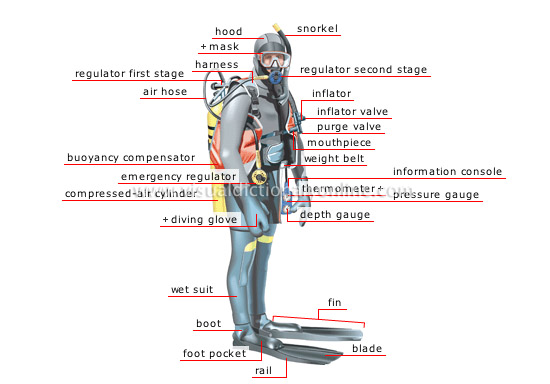scuba diver
Person who practices scuba diving; the diver wears diving gear and carries equipment that makes it possible to stay underwater for as long as the air supply lasts.
fin 
Rubber or plastic flipper that is attached to the foot and improves the diver’s propulsion in the water.
regulator second stage 
Apparatus that changes the pressure of the air coming from the regulator first stage to the pressure of the ambient air; the diver breathes this air in through a mouthpiece.
inflator 
Apparatus that inflates the buoyancy compensator; it often includes a mechanical system attached to the regulator as well as a mouthpiece for inflating it manually.
inflator valve 
Unit that controls the amount of air entering the buoyancy compensator.
mouthpiece 
Part for inflating the buoyancy compensator by blowing.
purge valve 
Device for releasing air from the buoyancy compensator.
thermometer 
Instrument for measuring the water’s temperature.
pressure gauge 
Apparatus for measuring the cylinder’s air pressure; this indicates to the diver how much air is available.
depth gauge 
Apparatus indicating the diver’s depth.
blade 
Thrusting part of the fin that is an extension of the foot pocket; its length and stiffness determine its thrusting power.
rail 
Side reinforcement of the fin; it makes the blade stiffer and improves the fin’s efficiency.
boot 
Synthetic rubber boot that protects the foot and ankle from the cold and from being rubbed by the fin.
wet suit 
Insulating outfit made out of synthetic rubber; a small amount of water is usually allowed to seep in and assume the diver’s body temperature.
diving glove 
Piece of synthetic rubber that covers the hand and wrist to protect them from the cold and from being hurt by underwater objects, plants and animals.
emergency regulator 
Regulator second stage that is connected by a hose to the regulator first stage; it is used to supply air to a diver in difficulty.
compressed-air cylinder 
Device containing air of diminished volume due to pressure; it stores air that can be used by the diver to move underwater.
buoyancy compensator 
Float device whose volume of air can be increased or decreased at will to stabilize the diver underwater; it can be used to return to the surface and to keep afloat without effort.
weight belt 
Fabric sash worn around the waist; it contains a variable number of weights to compensate for the diver’s natural flotation.
air hose 
Flexible tube that connects the regulator first stage to the emergency regulator.
regulator first stage 
Apparatus attached to the cylinder valve that lowers the air pressure coming from the cylinder to an intermediate value (medium pressure).
harness 
Piece of equipment with straps and suspenders; the diver uses it to carry one or more cylinders of compressed air on the back.
mask 
Watertight part that is made up of glass surrounded by a rubber skirt; it covers the nose and eyes and provides good visibility underwater.
hood 
Synthetic rubber cap that covers the head and neck to protect them against the cold.
snorkel 
Rigid or flexible tube that enables the diver to breathe from just under the surface without lifting the head out of the water; it provides a comfortable and efficient position for swimming.




















